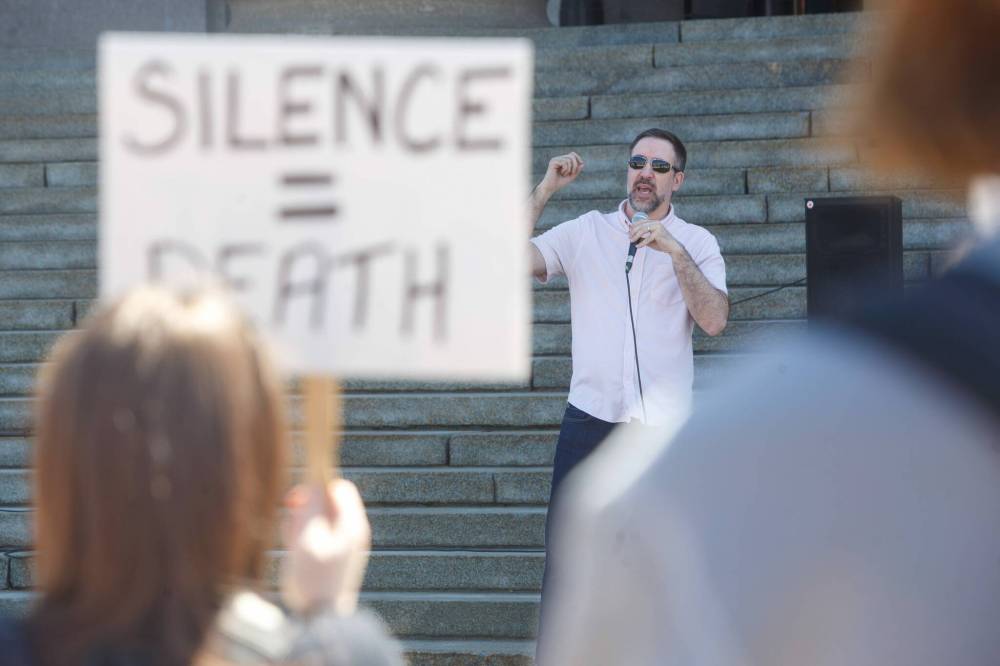Demonstrators demand action on safe-injection sites to stem rising HIV, AIDS rates in Manitoba
Advertisement
Read this article for free:
or
Already have an account? Log in here »
To continue reading, please subscribe:
Monthly Digital Subscription
$0 for the first 4 weeks*
- Enjoy unlimited reading on winnipegfreepress.com
- Read the E-Edition, our digital replica newspaper
- Access News Break, our award-winning app
- Play interactive puzzles
*No charge for 4 weeks then price increases to the regular rate of $19.00 plus GST every four weeks. Offer available to new and qualified returning subscribers only. Cancel any time.
Monthly Digital Subscription
$4.75/week*
- Enjoy unlimited reading on winnipegfreepress.com
- Read the E-Edition, our digital replica newspaper
- Access News Break, our award-winning app
- Play interactive puzzles
*Billed as $19 plus GST every four weeks. Cancel any time.
To continue reading, please subscribe:
Add Free Press access to your Brandon Sun subscription for only an additional
$1 for the first 4 weeks*
*Your next subscription payment will increase by $1.00 and you will be charged $16.99 plus GST for four weeks. After four weeks, your payment will increase to $23.99 plus GST every four weeks.
Read unlimited articles for free today:
or
Already have an account? Log in here »
Hey there, time traveller!
This article was published 04/05/2023 (951 days ago), so information in it may no longer be current.
Community organizations delivered a stark message to the province on the steps of the Legislative Building Thursday afternoon: do more to fight HIV and AIDS, or suffer the consequences of a health care-crisis.
Recent rising HIV infection case counts have been troubling for front-line service providers who say Manitoba’s history of colonialism and unjust treatment of those who inject drugs have resulted in some of the highest patient counts in the country.
Several dozen people, some holding signs reading “Harm reduction saves lives,” “Got naloxone?” and “Act up, fight back,” participated in the demonstration organized by the Manitoba branch of ACT UP, an acronym for AIDS Coalition to Unleash Power. The group has published a letter signed by hundreds of Manitobans and 41 community groups calling for a co-ordinated response from provincial leadership to combat the rising number of HIV infections in the province in advance of International Harm Reduction Day Sunday.

Mike Deal / Winnipeg Free Press
Thomas Linner, Provincial Director for Manitoba Health Coalition, speaks at a rally on the steps of the Manitoba Legislative building Thursday.
“We do have sex, right? We do use alcohol, we do use drugs. And so we need our government, whether it’s Liberal, NDP or Conservative, or whichever government, to understand this global pandemic of HIV has been around for 40 years, and it should not still be happening in Manitoba,” organizer Albert McLeod said.
“We’re a First World country, we have tons of money, and yet what’s been given around safe injection, harm reduction and HIV is a drop in the bucket.”
Manitoba reported 108 HIV cases from Jan. 1 to June 30 2022, the most recent data available. Those numbers are on track to exceed 2021, when 165 total cases were recorded. Data from 2020 shows Manitoba’s diagnosis rate per 100,000 people is behind only Saskatchewan nationwide.
Indigenous Manitobans are disproportionately affected. Data from 2018-21 shows that 51 per cent of those referred to the Manitoba HIV program in 2018 were Indigenous, and that increased to 73 per cent in 2021.
Speakers at the demonstration suggested 2022 case numbers could be as high as 280, which the Free Press was not able to confirm.
The rising case counts are not just a prevention issue, but an issue of toxic drug supply and the inability to access safe-injection sites in Manitoba, Manitoba Health Coalition provincial director Thomas Linner said.
“In terms of harm reduction, and in terms of those who are at the most need in our society right now, what we do (in Manitoba) is a perversion of triage. It is, in fact, the opposite,” he said.
“We take those with the most multiple needs, those facing the most multiple oppressions, and we put them at the bottom of our list, we put them to the back of the line.”
Needle-sharing among people who inject drugs puts them at an especially high risk of contracting HIV. Some local organizations hand out HIV self-tests.
Jacob Kaufman moved to Winnipeg 24 years ago to recover from a heroin addiction. In the past two years, he has lost 30 people close to him to drug overdoses.
“What kills me is the fact that these guys over here will do nothing to save my family,” he said, gesturing toward the Legislative Building.
To combat HIV, he said, the province has to catch up to other places across the country and invest in safe-injection sites.
“The proof is in the pudding,” he said. “As soon as we start getting a non-toxic drug supply, a safe supply, for people who choose to use whatever they use, then we’re going to see less and less deaths.”
malak.abas@freepress.mb.ca

Malak Abas is a city reporter at the Free Press. Born and raised in Winnipeg’s North End, she led the campus paper at the University of Manitoba before joining the Free Press in 2020. Read more about Malak.
Every piece of reporting Malak produces is reviewed by an editing team before it is posted online or published in print — part of the Free Press‘s tradition, since 1872, of producing reliable independent journalism. Read more about Free Press’s history and mandate, and learn how our newsroom operates.
Our newsroom depends on a growing audience of readers to power our journalism. If you are not a paid reader, please consider becoming a subscriber.
Our newsroom depends on its audience of readers to power our journalism. Thank you for your support.







